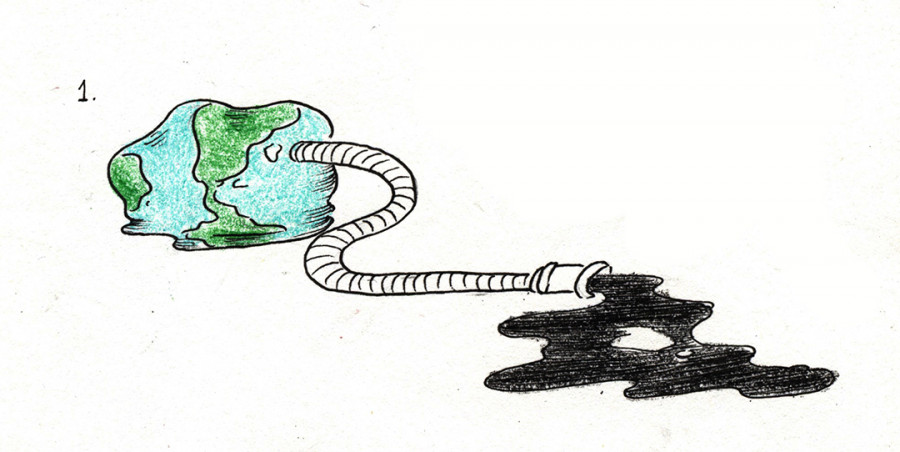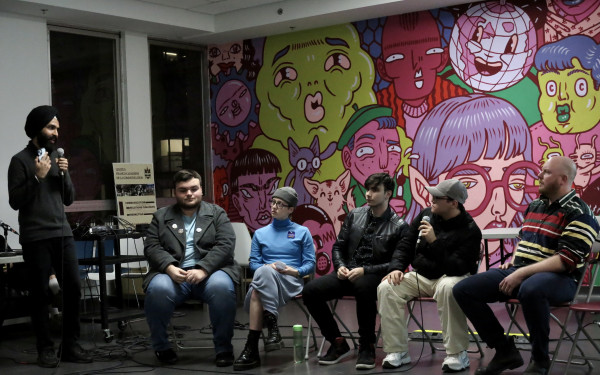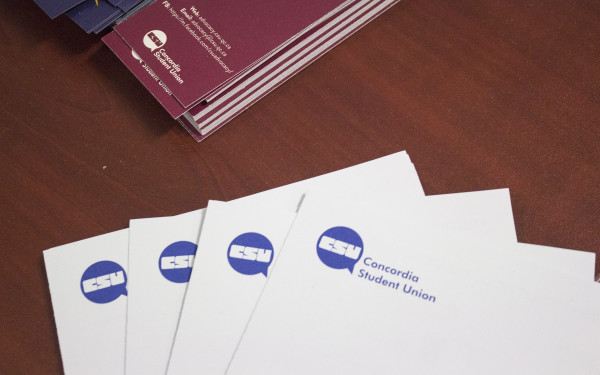CSU By-Election: Your Guide to the Four Referendum Questions
The Concordia Student Union by-elections run this week from Nov. 15-17.
Quorum for the by-election is 450 undergrad students. Here are the four referendum questions you can vote on:
Fossil Fuels Divestment Campaign

Do you, as a Concordia undergraduate student, mandate the Concordia Student Union to actively support the fossil fuels divestment campaign until such time as Concordia University commits to full divestment from fossil fuels and related industries?
If passed, this referendum question would help to solidify the CSU’s policy of pursuing divestment from fossil fuels. This would make the policy more binding for present and future CSU executives. According to Eamon Toohey, a spokesperson of the student union, a referendum is the most legitimate way for the CSU to establish any sort of policy.
If this question gets enough “Yes” votes from Concordia undergraduate students, the CSU “would continue to put more pressure on the university to freeze its investments in fossil fuels now and to be fully divested in the next five years,” Toohey said.
He added that, as a community, Concordia students are complicit with the decisions of the university’s administration, and that, by extension, fossil fuel investments are our responsibility, too.
“We have a responsibility to challenge the university’s investments and pressure the administration to pursue a more sustainable future, a more ethical future, and even a more economically feasible future,” Toohey said.
Concordia University Investments

Do you, as a Concordia undergraduate student, agree with Divest Concordia’s demand that Concordia University remove all its investments that are currently tied to the fossil fuel and related industries and reinvest this money in a socially and environmentally responsible manner?
Divest Concordia is a coalition of students that wants the university to completely remove all its investments in the fossil fuel industry. The group has been pressuring the university to reinvest in sustainable practices since 2013.
Its goal is to have the university freeze all of its current investments in fossil fuels over the next three years. Divest also wants Concordia to adopt a socially and environmentally responsible investment policy designed in part by Concordia students, and for the university to later call on other universities to divest as well.
According to Marcus Peters, the Concordia Student Union’s Loyola Coordinator, a socially and environmentally responsible investment policy would include investments in green energies like hydro, wind and solar, and investments in co-ops and non-profit organizations. It would also mean avoiding investments in fossil fuel-related industries, like pipelines or mining.
QPIRG Concordia

Do you agree to increase the fee levy of QPIRG Concordia by eight cents per credit to a total of 39 cents per credit indexed to inflation in accordance with the Consumer Price Index for Canada, effective January 2017?
The Quebec Public Interest Research Group at Concordia hasn’t had an increase to its undergraduate fee levy since 2007. Currently, it stands at 31 cents per credit, but QPIRG’s board believe its daily operations in the past few years have suffered due to inflation.
With more money going towards administrative and operational expenses, there’s less money to fund projects from their 29 existing working groups and establish connections with new ones, according to board member Camille Thompson. In its last fiscal year from October 2015 to August 2016, QPIRG reported a net loss of $23,066.
Among the 29 working groups, Gabriel Velasco, another board member, highlighted the services of lesser-known organizations like Montreal Childcare Collective and Open Door Books Montreal, in addition to more known ones like Solidarity Across Borders.
“We are the link between the Concordia community and at large,” Velasco said.
The Collective offers childcare services mainly for public events, Velasco explained, while the Open Door Books aims to provide literature to the imprisoned population.
For its last fiscal year, the Montreal Childcare Collective received $550 from QPIRG, and the Open Door Books had $1550. In total, working groups received $22,296 last year.
In addition to the working groups, QPIRG has a “discretionary budget” for other organizations that submit applications for funding directly to the board. These groups can receive $50 to $400 per application. Beneficiaries of this initiative have included the Unist’ot’en Camp, Black Mental Health Circle, and Rap Battles for Social Justice at Concordia.
QPIRG Concordia made $258,349 in revenue during its last fiscal year. Most of this comes from undergraduate and graduate fee levies—$233,965—and employment grants—$21,449. Concordia graduate students pay 50 cents per credit into the organization.
The organization has three full-time staff members, and they are paid $21.70 per hour. Approximately $110,000 went towards permanent staff expenses last year.
Located on the second floor of 1500 de Maisonneuve Blvd. W., QPIRG Concordia offers use of its computers, phones, fax machines, and photocopier, as well as the space itself, to the local community. Rent and electricity for the space cost $55,839 last year. Velasco said offsetting these costs is one of the reasons they’re asking for a higher fee levy.
“If students believe what QPIRG is and working for, we’re hoping they’ll come out and vote,” Thompson said.
Community Action Fund

Do you, as a Concordia undergraduate student, agree with the amendment to the CSU Special Bylaw I, as outlined in the document “Amendment to Special Bylaw I”?
CSU Special Bylaw I details the dispersion of the student union’s fee-levy of $3.80 per credit for all undergraduate students. As it stands, $1 of the $3.80 goes towards the Student Space, Accessible Education and Legal Contingency fund.
This fund, unlike the CSU’s operating budget, is not necessarily used on a yearly basis. Instead, it is saved for special projects that fall under the SSAELC fund’s jurisdiction. Last year, for example, approximately $1.4 million from the SSAELC Fund was used finance necessary renovations for the reopening of Reggie’s, Concordia’s campus bar.
At the end of the 2015-16 academic year, the fund totaled approximately $3 million, according to a draft of the CSU’s financial audit from that year.
The proposed amendment to Special By-Law I would allow in part for the creation of the Community Action Fund. The CAF would amass a portion of the SSAELC fund’s annual interest, falling within the $50,000 to $75,000 range. It states that this money would go towards financing “initiatives or organizations aligned with the CSU Position Book but that aren’t necessarily Concordia-based.”
It would also “accommodate costs needed by a Concordia University undergraduate student association in case of a binding strike mandate voted by said association,” and provide “additional resources and to accommodate costs needed in case of a binding strike mandate approved by the membership at a duly convened Special General Meeting.”
Aloyse Muller, external affairs and mobilization coordinator for the CSU, explained that the creation of the fund would alleviate the burden on the CSU’s existing operating and mobilization budget.
“The CAF is something that is really lacking right now, at Concordia,” explained Muller. “We have a very limited capacity to respond to emergencies.”
He listed, for example, that the legal contingency portion of the fund is reserved solely for scenarios in which the “integrity of the CSU itself is being compromised by law.”
The CAF would broaden the CSU’s ability to help students in need of legal aid.
Muller further explained that the mobilization and grant-funding aspect would allow for the CSU to help without taking money from the union’s operations.
“This gives us the flexibility of always having a little bit of cash,” he stated. “So when a surprise hits, we are in a position of being able to respond to it.”

_900_604_90.jpg)





